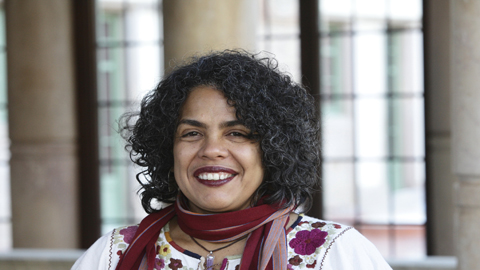"Dominant differences are unnatural"
In the interview, Espinosa spoke on the inequalities existing in Latin America - where she was born - and the social inequalities around the world, as well as ways to eradicate them. She also told us how she felt about current feminist movements.

-This conference uses Latin America as a starting point and signals it as a region with one of the highest index of inequality in the world. What factors influence this?
- It is related to a tragic event in history we call the conquest, pillage and colonisation of the Abya Yala continent by the hegemonic and imperial European project and the historical process which then began and which is known as coloniality. This imposes an economic, epistemic and political order at global level which first of all is based on defining as non-human and backwards all societies and people who are not European. That justified massacres, the expropriation of land, pillages, an unlimited production of goods for the cities of Europe thanks to slave labour and which ended in an unequal distribution of wealth in the world. The inequalities which can be seen now are nothing more than the results of what happened then. Nevertheless, one should also be wary of how indicators are formulated in order to calculate these world indexes. One should be aware of the fact that the definition is based on a level of wellbeing and good life corresponding to an organisation model of society and standards which pertain to modern Western societies. I would say there are societies which question a common idea of "equality" that we see in development projects and indexes.
- How can inequalities based on gender, specifically in Latin America, be eradicated, or at least reduced?
- From my point of view, that is only possible if at the same time projects are carried out which work on eradicating the economic model of capitalism from the market, the international division of race and gender from the workplace, and the heterosexual regime produced by a binary reading of the body. Without fighting all these types of inequalities, oppression and domination will continue for the majority of "women"; it is their lives which must suffer the consequences of powers based on racism and capitalism.
- In a richer country or region, do you think there would be less exclusion for reasons of gender, race or ethnic group? What would it depend on?
- I don't think that has anything to do with it. To actually end with these injustices we would need to delve deeply into all of these categories epistemically, materially and economically. To eliminate them, not only in linguistic terms but also in terms of its social structure and role. We must locate, learn, recover and improve other forms of organisation which go beyond these hierarchical relations of dominance.
- In what way does social exclusion processes manifest and reproduce themselves in the higher education sector? (This is the main objective of study of the conference in which Espinosa participated.)
- Through a university model based on universal standards of evaluation of achievements and measurement of knowledge devised in countries of the North and applied to all others. This model always ends up benefiting white middle-class and upper-class men and, thanks to the rights acquired by feminist movements, which women of the same classes. At the gender and sexuality programmes, institutes and centres we are able to see how the systems of race and class work by observing who occupies position of management, teaching and research. The ones considered objects of research and those considered products of knowledge. A recent research I conducted points in this direction.
- And now I would like to ask you something you yourself said at the end of the conference: What does feminist theory represent today? Why is it useful?
- To tell you the truth, I do not have an optimistic view on this. I believe feminist theory in general, the one which is most disseminated, in its Eurocentrism, was already criticised decades ago by feminists and black women, indigenous and non-whites, and that turns it into a racist theory by omission, because it does not reveal the hidden side of modernity. It is a theory which in many ways has believed in, and therefore helped, the process of Westernisation. However, I admit that within this theorisation there are marginal groups attempting to counterattack this hegemonic tendency. These other projects need to be urgently listened to as a response to the mainstream sense of feminism existing now. These other feminist theories draw new horizons which give continuity to the projects of common life organisation outside of the domination matrix produced by Western modernity and a modern system of gender colonialism. They weave the hope for a better world.
- In what ways does living with all types of differences make us advance as a society? In other words, can it be positive and beneficial?
- Dominant differences are not natural, they were produced by the domination matrix precisely with the aim of producing oppression. Therefore, I cannot see how it is beneficial to live with them. There is nothing like a harmonious relationship between rich and poor, blacks and whites, heterosexuals and dissenting sexualities, between men and women, white middle-class women and subaltern racialised women... Each one of these subjective positions form part of the system of hierarchies which set the bases, organise and guarantee oppression and exploitation. Another thing would be to think of the non-dominating differences which exist and make us each unique as a person, as Audre Lorde would say. But we are far from being able to envision this, because we are so caught up by constituting contemporary identities of homogenisation that, many times, we find ourselves in antagonistic positions.